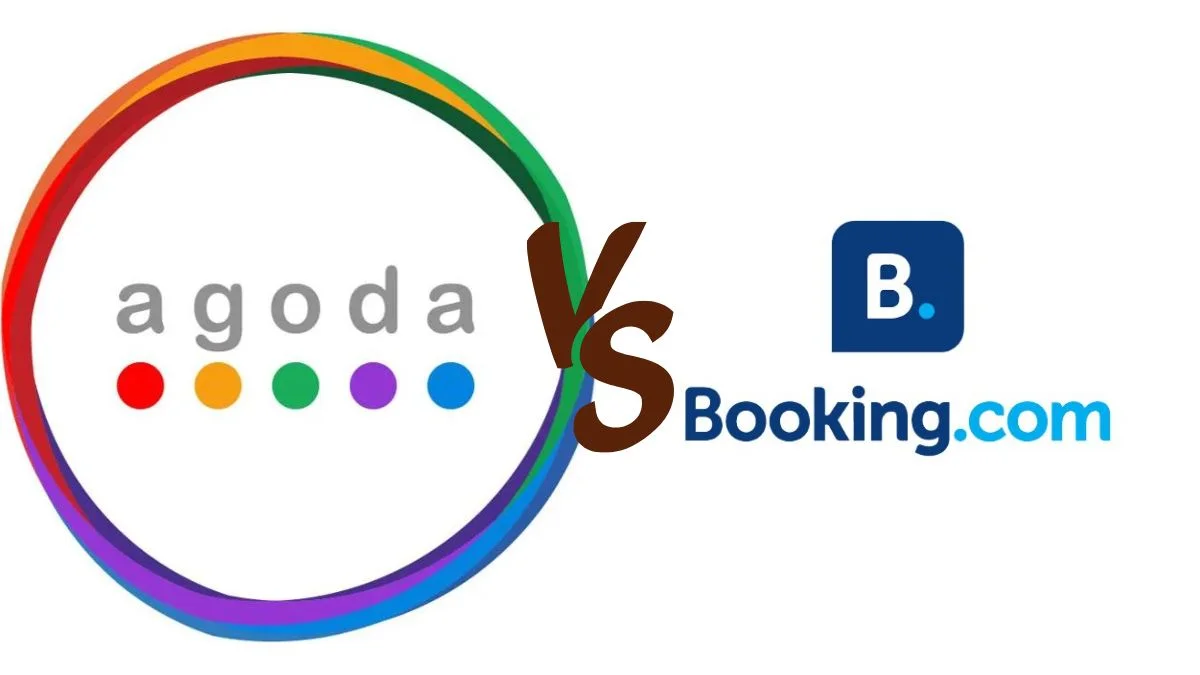Agoda Vs. Booking.com: A Detailed Analysis of Two Leading Travel Booking Giants

As participants in Amazon Associates and other programs, we earn from qualifying purchases. This comes at no additional cost to you. For more details, see our Affiliate Disclosure.
In the digital age, the way we plan and book our travels has transformed dramatically. Among the front-runners of this online travel revolution are Agoda and Booking.com. As two of the most popular and widely-used platforms, they’ve revolutionized how travelers across the globe make hotel reservations, plan trips, and explore new destinations. But how do they compare in terms of service, offerings, and user experience? In this article, we’ll dive deep into the world of Agoda and Booking.com, dissecting the strengths, weaknesses, and unique features of each platform.
HIGHLIGHTS
- Booking.com offers a more expansive global presence, making it an ideal choice for travelers seeking widespread coverage and local nuances.
- While Agoda excels with regional payment adaptability and unique features like ‘Secret Deals’, Booking.com provides comprehensive travel resources and an integrated approach to travel planning.
- Both platforms prioritize user flexibility with various cancellation policies, but Booking.com’s clear categorization gives travelers added confidence.
- Booking.com emerges slightly ahead due to its all-encompassing travel services and adaptability to global travelers’ needs.
Website and User Interface: A Look at User-Friendliness
Navigating the vast digital seas of travel booking can be a daunting task, and it’s here that an intuitive website and user interface can make all the difference. Both Agoda and Booking.com pride themselves on offering streamlined platforms designed for ease of use. But when it comes to user-friendliness, which of the two stands out?
Agoda: Simplifying Digital Bookings
Agoda’s website and interface are characterized by their minimalistic design. With a calming color scheme, prominently placed search bars, and neatly organized listings, users can effortlessly navigate through options. The site places a particular emphasis on its “Deals of the Day” – tempting travelers with time-sensitive offers.
Filtering options, from budget to star ratings and specific amenities, help users customize their search, ensuring they find accommodations best suited to their needs.
Booking.com: Comprehensive Yet User-Friendly
On the other hand, Booking.com offers a comprehensive interface that many find extremely user-friendly. The website welcomes users with an expansive search bar, guiding them immediately to start their booking process.
It further boasts myriad filtering options that, while vast, are presented in a way that doesn’t overwhelm the user. Their interactive map feature, displaying the properties in relation to landmarks or attractions, is especially beneficial for those keen on location-specific bookings.
In the showdown of website and user interface, Booking.com slightly edges out with its interactive map feature and well-balanced blend of comprehensive options and user-friendliness. The platform ensures that while users have a wealth of information and options at their fingertips, they’re never overwhelmed.
Property Listings and Variety: From Budget to Luxury
A diverse range of property listings is the heart and soul of any travel booking platform. Travelers today come with varied preferences – from shoestring backpackers hunting for the cheapest hostels to luxury-seekers wanting a five-star resort experience. Agoda and Booking.com both cater to this spectrum, but which platform offers a richer, more diverse catalog for wanderlust-driven souls?
Agoda: An Eclectic Mix of Stays
Agoda stands out for its eclectic mix of properties. While it began primarily focusing on the Asian market, its expansion has seen the platform incorporate a wide range of accommodations globally. This diversity is particularly evident in Asia, where users can find everything from beachfront bungalows in Thailand to capsule hotels in Tokyo.
Agoda often collaborates with local businesses, ensuring users access to authentic and sometimes lesser-known stays, offering a unique cultural immersion.
Booking.com: Global Reach with Extensive Listings
Booking.com, with its global outreach, boasts one of the most extensive property listings in the online travel space. Whether it’s a boutique hotel in Paris, a cabin in the Rockies, or a desert camp in Morocco, the platform has it all.
One of Booking.com’s strengths is its robust verification process, ensuring that each listing provides a consistent standard of quality. Moreover, their review system allows potential travelers to get a genuine feel for the property, often making decision-making more comfortable.
When it comes to property listings and variety, Booking.com emerges as the winner, primarily due to its vast global reach and meticulous verification process. Its extensive listings, combined with a trustworthy review system, offer travelers both diversity and peace of mind, ensuring they find their perfect stay no matter the destination.
Pricing and Deals: Which Offers Better Value?
The hunt for the best deals is integral to the travel planning process. Everyone loves a bargain, especially when it’s related to travel expenses, which can quickly add up. Both Agoda and Booking.com are renowned for their attractive deals and competitive pricing. But when the dust settles, which of these giants offers travelers the better bang for their buck?
Agoda: Competitive Pricing with Daily Deals
Agoda has carved a niche for itself with its aggressive pricing strategy. Their “Deals of the Day” section consistently offers discounts that can be significantly lower than other platforms, especially when it comes to Asian destinations.
Partnered with a rewards program that enables users to accumulate points with each booking, Agoda ensures that loyal customers often find themselves availing even better deals. The platform’s secret deals, which offer hefty discounts for unbranded properties, are a treasure for the price-conscious traveler.
Booking.com: Price Match Guarantee and Varied Discounts
Booking.com prides itself on its “Price Match” guarantee. If a traveler finds a cheaper rate for a booked property on another platform, Booking.com promises to match that price. This guarantee instills confidence in users about getting the best possible deal.
Additionally, the platform frequently rolls out seasonal and destination-specific discounts, catering to a broad audience. Their “Genius” loyalty program further entices users by offering exclusive deals to regular bookers.
In the realm of pricing and deals, it’s a tight contest. But given its promise of price matching and the breadth of its discounts, Booking.com slightly edges ahead. The “Price Match” guarantee ensures that users always secure the best deal, reinforcing trust and loyalty to the platform. Whether you’re an occasional traveler or a regular wanderer, Booking.com consistently offers value for money.
Customer Service: Handling Hiccups on the Road
In the unpredictable world of travel, where plans can change in the blink of an eye and unforeseen challenges can arise, reliable customer service becomes paramount. Both Agoda and Booking.com recognize the importance of swift, efficient, and empathetic customer support. When travelers face an issue, which platform proves to be the more reliable safety net?
Agoda: 24/7 Support with a Multilingual Touch
Agoda places high emphasis on catering to a global audience. This commitment shines through in their 24/7 customer support, which offers assistance in multiple languages. Their helpline, available via phone or live chat, is staffed by representatives trained to resolve issues promptly.
Whether it’s a booking error, refund request, or general travel advice, Agoda’s team seeks to provide travelers with quick solutions. Moreover, their extensive FAQ section helps users address many common queries without even needing to reach out.
Booking.com: Personalized Solutions with Global Reach
Booking.com’s customer service is a reflection of its vast operational scale. With dedicated helplines for different countries and a live chat feature, they ensure that travelers, no matter where they are, can access support. What sets Booking.com apart is its approach to personalized service.
Upon facing a challenge, travelers often receive tailor-made solutions that suit their specific situation. Their extensive database also allows them to manage and modify bookings with ease, ensuring minimal inconvenience to the user.
When it comes to customer service, the nod goes to Booking.com for its unparalleled personalized touch. While both platforms offer exceptional support, Booking.com’s dedication to crafting solutions tailored to individual traveler’s needs sets it a notch above the rest. In the unpredictable landscape of travel, such attention to detail is not just appreciated but often essential.
Mobile App Comparison: Booking on the Go
In today’s fast-paced world, the shift from desktop to mobile is more than just a trend—it’s a necessity. As travel planning becomes increasingly spontaneous and last-minute, the importance of a robust mobile application cannot be understated. Both Agoda and Booking.com have ventured into this mobile realm, offering users the convenience to plan and book on the go. But which app truly simplifies the traveler’s journey?
Agoda: Streamlined for Swift Bookings
Agoda’s mobile app reflects the platform’s ethos of simplicity and efficiency. Designed with a user-friendly interface, the app makes searching for and booking accommodations a breeze. Features like in-app maps, instant booking confirmations, and mobile-exclusive deals enhance the user experience.
Additionally, the app’s smooth integration with the rewards program ensures that users can both earn and redeem points seamlessly. With push notifications alerting travelers to new deals and booking reminders, Agoda ensures its users are always in the loop.
Booking.com: A Comprehensive Travel Companion
Booking.com’s mobile application is more than just a booking tool—it’s a holistic travel companion. Alongside the core functionality of property search and booking, the app offers features like travel guides, local tips, and personalized recommendations.
Its ‘Reservations’ section provides users with a consolidated view of their upcoming trips, making itinerary management easy. The app also excels in offering real-time availability, ensuring last-minute travelers find suitable accommodations. With its “Genius” loyalty program integrated, users can effortlessly access exclusive deals and offers.
In the battle of mobile apps, Booking.com stands out as the victor. While Agoda’s app is streamlined and efficient, Booking.com’s application provides a comprehensive travel experience, making it more than just a booking tool. From guides and local tips to real-time availability and a consolidated view of itineraries, Booking.com ensures every traveler’s need is just a tap away.
Loyalty Programs and Rewards: Earning While You Explore
Loyalty programs are more than just an incentive; they’re a testament to a platform’s commitment to rewarding its regular patrons. As the adage goes, ‘Travel is the only thing you buy that makes you richer,’ and with these reward programs, this sentiment takes on a literal meaning. Both Agoda and Booking.com have curated their loyalty schemes to enhance the traveler’s journey, but which one offers the more rewarding experience?
Agoda: PointsMAX and Personalized Perks
Agoda’s loyalty program, known as PointsMAX, is tailored to give travelers a chance to earn while they book. By linking their preferred loyalty program, users can accrue points every time they make a reservation. The beauty of PointsMAX is its flexibility; travelers can choose from various partner programs, including airline frequent flyer and hotel reward schemes.
Over time, these points can be redeemed for significant discounts or even complimentary stays. Agoda further sweetens the deal by offering personalized deals and promotions to its regular users, making each booking feel like a unique reward.
Booking.com: The Genius Loyalty Program
The Genius Loyalty Program is Booking.com’s answer to rewarding its devoted clientele. After just two bookings, users ascend to Genius Level 1, unlocking a minimum of 10% discount on a myriad of participating properties. As travelers continue to book, they can advance to higher Genius levels, with each tier offering more substantial benefits, from room upgrades to free breakfasts.
The program is streamlined and straightforward, ensuring users can easily understand and avail their benefits. Its structure encourages not just initial engagement but continued patronage, fostering a lasting relationship between the platform and its users.
In the arena of loyalty and rewards, Booking.com’s Genius Loyalty Program takes the crown. While Agoda’s PointsMAX offers commendable flexibility, the Genius program’s simplicity, combined with its tiered benefits, ensures travelers consistently feel valued. The clear progression and tangible rewards at each level keep users engaged and incentivized, making their every journey a bit more rewarding.
User Reviews and Ratings: Gauging Public Perception
In the age of the informed traveler, reviews and ratings often hold the key to decision-making. They offer a glimpse into real experiences, unfiltered and honest. Both Agoda and Booking.com realize the gravity of this user-generated content, offering platforms for travelers to share their tales and insights. When diving into the sea of reviews, which platform offers a clearer, more trustworthy reflection of the travel experience?
Agoda: A Detailed Dive into User Experiences
Agoda’s review system is comprehensive and detail-oriented. Users are prompted to rate various facets of their stay, from location to cleanliness, staff behavior, and amenities. This segmented approach allows potential travelers to focus on aspects most crucial to them.
Additionally, Agoda ensures that only those who have booked through their platform and completed their stay can leave a review. This verification process lends authenticity to the feedback, assuring readers of its credibility. The platform also encourages reviewers to upload photos, further enriching the depth of insight offered.
Booking.com: Transparent Feedback with a Personal Touch
Booking.com’s review system thrives on transparency. Like Agoda, only verified guests can leave reviews, ensuring the genuineness of feedback. Each property is given an overall score based on user ratings, providing an at-a-glance assessment. What sets Booking.com apart is the “Positives” and “Negatives” section in each review.
Travelers can quickly highlight what they loved and what could have been better, giving a balanced view of their experience. Additionally, the platform often showcases reviews from travelers with similar preferences or backgrounds, allowing users to gauge how well a property might suit their specific needs.
Drawing insights from user reviews and ratings, Booking.com emerges slightly ahead. While both platforms offer detailed and verified reviews, Booking.com’s structured “Positives” and “Negatives” segments, coupled with the ability to access reviews from like-minded travelers, grant users a more nuanced and personalized understanding. This level of clarity ensures travelers can make informed choices that align seamlessly with their expectations.
Payment Options and Flexibility: Making It Easy for Travelers
In the intricate dance of travel planning, how one pays can be as crucial as what they’re paying for. A platform’s adaptability in payment options can mean the difference between a smooth booking experience and a missed opportunity. Both Agoda and Booking.com have endeavored to offer a plethora of payment methods, catering to the varied needs of global travelers. But which platform truly champions ease and flexibility in financial transactions?
Agoda: Diverse Methods with Regional Adaptability
Agoda is renowned for its focus on catering to regional preferences. Recognizing that payment habits vary greatly across countries, Agoda offers a suite of methods tailored to individual markets.
From major credit cards and PayPal to regional options like Alipay for Chinese travelers or Paytm for those in India, Agoda ensures that users can pay in the manner most convenient for them. Moreover, Agoda often provides the “Book Now, Pay Later” option for many properties, giving travelers the flexibility to lock in a rate without immediate financial commitment.
Booking.com: Universal Options with a Trustworthy Approach
Booking.com takes a more universal approach to payments. Offering all major credit and debit cards, alongside widely accepted digital payment methods like PayPal, the platform ensures a seamless experience for the majority of its users. One standout feature of Booking.com is its focus on secure transactions.
The platform employs stringent security protocols, ensuring users’ financial data remains confidential and safe from potential breaches. While its range of payment methods might not be as diverse as Agoda, the platform compensates by ensuring reliability and trustworthiness in every transaction.
In the realm of payment options and flexibility, Agoda takes the lead. While Booking.com offers a secure and universal approach, Agoda’s commitment to regional adaptability and the added flexibility of “Book Now, Pay Later” options make it exceptionally traveler-friendly. For the globetrotter looking for payment ease tailored to their locale, Agoda emerges as the go-to platform.
Coverage and Global Presence: Which Has the Wider Reach?
The scope of a booking platform is often measured by its global footprint – the breadth of its reach and the depth of its local integration. A traveler’s journey can take them from bustling metropolitans to secluded hamlets, and the ideal platform should be able to guide them through both with ease. Agoda and Booking.com, both giants in the industry, claim extensive global networks. But which one truly offers the traveler a more expansive canvas to paint their travel dreams upon?
Agoda: Asian Powerhouse with Expanding Horizons
Agoda’s origins in Asia have given it a distinct advantage in this vast and varied continent. The platform boasts an unrivaled presence in countries like Thailand, Indonesia, and Malaysia, offering an array of properties ranging from five-star resorts to quaint guesthouses.
Its deep local partnerships often mean exclusive deals and a wider range of property types in these regions. While its dominance in Asia is unquestionable, Agoda has been steadily expanding its reach, making inroads into European, African, and American markets. The blend of local depth and global aspirations makes it a formidable contender.
Booking.com: A Global Juggernaut with Local Nuances
Booking.com’s strength lies in its extensive worldwide network. With properties in over 220 countries and territories, it’s hard to find a spot on the map where Booking.com doesn’t have a presence. Their vast portfolio includes hotels, apartments, villas, and even more unique lodgings like treehouses and igloos.
While the platform’s reach is undeniably global, what impresses is its local integration. Each region’s offerings are curated with a deep understanding of local preferences and nuances, ensuring travelers get a genuine experience no matter where they are.
In the contest of coverage and global presence, Booking.com emerges as the clear winner. While Agoda’s stronghold in Asia and its expanding horizons are commendable, Booking.com’s sheer global expanse, combined with its adept local integration, makes it the ultimate travel companion for wanderlusters aiming to explore every nook and cranny of the world.
Cancellation Policies: Preparing for the Unexpected
Travel, by its very nature, is subject to the whims of circumstance. Whether it’s a sudden change in weather, personal emergencies, or global events, travelers require flexibility to adjust their plans. This makes a platform’s cancellation policy a vital factor in the booking decision. Both Agoda and Booking.com acknowledge this need for flexibility, but their policies differ in nuances. Which platform offers more peace of mind when the unexpected happens?
Agoda: Conditional Flexibility with Clear Terms
Agoda’s cancellation policy is often determined by the property rather than the platform itself. While searching for accommodations, users can filter properties based on their cancellation preferences, from non-refundable rates to fully flexible options.
When a property does offer free cancellation, the terms are clearly laid out, specifying the window within which a traveler can cancel without incurring charges. While this means a diverse range of cancellation options, it also requires users to pay close attention to individual property terms to avoid surprises.
Booking.com: Consistent Clarity with Varied Options
Booking.com prides itself on transparent and straightforward cancellation policies. Like Agoda, the specific cancellation terms are often set by the property. However, Booking.com categorizes these policies into easily understandable tiers, such as ‘Non-Refundable’, ‘Free Cancellation’, or ‘Partial Refund’.
This categorization simplifies the decision-making process for travelers. Additionally, Booking.com often offers a ‘Reserve Now, Pay Later’ option for many properties, allowing users to make tentative plans without immediate financial commitment.
Navigating the terrain of cancellation policies, Booking.com holds a slight edge. While both platforms provide a range of flexible options, Booking.com’s clear categorization and the additional ‘Reserve Now, Pay Later’ feature ensure that travelers can make decisions with greater confidence. In the unpredictable realm of travel, such clarity and consistency offer invaluable peace of mind.
Unique Features and Standout Services: The X-factor for Each Platform
In the competitive realm of online travel booking, it’s not just about offering the basics but also about standing out from the crowd. The additional features, innovations, and bespoke services a platform provides can be the tipping point for a traveler teetering between choices. Both Agoda and Booking.com have their unique offerings that set them apart. But what are these standout services, and which platform’s X-factor truly enriches the travel experience?
Agoda: Secret Deals and Adventure Awaits
Agoda’s ‘Secret Deals’ is an innovative feature that offers travelers hefty discounts on properties without immediately revealing the hotel’s name. Only after the booking is complete does the mystery unveil. This offers a delightful blend of surprise and savings for the adventurous traveler.
Additionally, Agoda has started branching out into ‘Agoda Homes’, where users can list or book private residences, bringing a more personal touch and a home-away-from-home feel to the travel experience.
Booking.com: Travel Guides and Seamless Integrations
Booking.com’s unique edge comes from its comprehensive travel resources. The platform provides ‘Travel Guides’ – curated articles and insights on major destinations that give travelers a holistic view of a place beyond just accommodation. It offers recommendations on attractions, dining, and local experiences.
Additionally, Booking.com seamlessly integrates car rentals and flight bookings, positioning itself as a one-stop-shop for all travel needs. This integrated approach simplifies the traveler’s journey, allowing them to plan every aspect of their trip on a single platform.
When weighing the unique offerings, Booking.com slightly takes the lead with its all-encompassing approach. While Agoda’s ‘Secret Deals’ and ‘Agoda Homes’ are exciting additions, Booking.com’s in-depth ‘Travel Guides’ and the platform’s ability to cover every facet of a trip — from flights to car rentals — ensures that travelers have everything they need at their fingertips. The convenience of this integrated approach is a true game-changer for the modern traveler.
Final Verdict: Agoda vs. Booking.com – Who Takes the Crown?
In the clash between Agoda and Booking.com, each platform shines in its unique ways, catering to the diverse needs and preferences of global travelers.
However, if we were to crown a winner, Booking.com takes the lead. Its extensive global coverage, clear and consistent policies, in-depth travel guides, and a holistic approach to travel planning ensure that users have a seamless experience from start to finish.
While Agoda’s regional strengths and innovative features are commendable, Booking.com’s comprehensive offerings and adaptability to the needs of travelers worldwide make it the ultimate travel companion for a broad spectrum of adventurers.
Whether you’re a solo backpacker or planning a luxurious getaway, Booking.com’s versatility and depth position it a notch above in the online travel booking arena.






